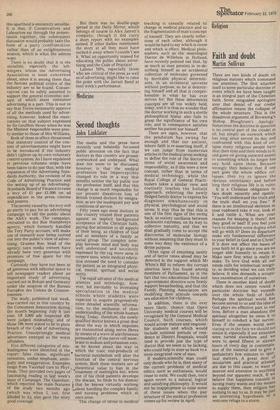Medicine
Second thoughts
John Linklater
The media and the press have recently and belatedly focussed public attention on the fact that doctors in this country are grossly overworked and underpaid. What does not seem to be discussed, however, is that the medical profession has imperceptibly changed its role in a way that benefits neither the lay public nor the profession itself, and that this change is as much responsible for our present disastrous loss of British trained doctors by emigration, as are the inadequate pay and conditions of service.
Fifty years ago most doctors in this country treated their patients against an implicit background acceptance of the Christian faith, paying due attention to all aspects of their being, as children of God and so members of a family or social group. The complex interplay between mind and body was well understood and succinctly expressed by the tag mens sana in corpore sano, while medical education stressed the need to consider the patient as an integrated physical, mental, spiritual and social entity.
The rapid advance of the medical sciences and technology, however, led inevitably to increasing specialisation in the medical schools where students were expected to acquire progressively more detailed scientific information, to the exclusion of their understanding of the whole human being. Today, therefore, the newly qualified doctor knows a great deal about the way in which impulses are transmitted along nerve fibres by means of a wave of asychronous permeability of the nerve cell membrane to sodium and potassium ions, as he knows about the way in which the toxic end-products of bacterial metabolism will alter the function of the central nervous system. Both these matters are of
i.,4theoretical value to him in the
I . treatment of meningitis but, when one of his child patients develops the disease, he finds to his dismay that he knows virtually nothing .,about handling the complex family and nursing problems which at once arise.
This change of stress in medical teaching is casually related to change in medical practice and to the fragmentation of man's concept of himself. They are clearly reflections of each other, although it would be hard to say which is cause and which is effect. Medical philosophers, such as the neurologist Doctor de Willebois in Holland, have recently pointed out that, by as much as man persists in re-describing himself as an accidental collection of molecules governed by inevitable physical determinants, in an accidental universe without purpose, so he is destroying himself and all that is comprehensible in what he has ever striven for. But these determinist concepts are all too widely held, today, and it is thus no wonder that the doctor working in such a sterile philosophical hiatus also fails to grasp the significance of his own role, and in consequence satisfies neither his patient nor himself.
There are signs, however, that the pendulum has swung far enough and that our ancient, inborn faith is re-asserting itself, if we can judge from numerous articles in the medical press seeking to define the role of the doctor in terms of social awareness and responsibility, as if this were a new concept, rather than in terms of medical technology, while the Royal College of General Practitioners takes a similar view and routinely teaches the holistic approach, exhorting the newly fledged family doctor to express his diagnoses simultaneously in. physical, psychological and social terms. It may thus be that this is one of the first signs of the swing back, as society oscillates between adolescent extremes, on its way to collective maturity, and that we shall gradually come to accept the discoveries of molecular biology without assuming that they must in some way deny the existence of a divine purpose.
Other signs of returning sanity and of better times ahead may be detected in the support which Mr White's Bill to reform the corrupt abortion laws has found among members of Parliament, as in the fact that two educational films and a government directive now firmly support breastfeeding, and that the Family Planning Association are modifying their attitude towards sex education for children.
In addition, there is the ever more likely, chance that Open University medical courses will be recognised by the General Medical Council. Such courses, which would accept mature and responsible students and which would include minimal periods of residence at District Hospitals, would tend to provide just the type of doctor that we seem to be lacking, who could help to steer us back to a more integrated view of man.
If modern,scientific man could only decide who he is, then many of the current problems of medical ethics, such' as euthanasia, would cease to exist. We could then, once again revert to a natural, logical and satisfying philosophy. It would not be inappropriate to raise some of these issues when the pay structure of the medical profession comes up for review in April.


































 Previous page
Previous page